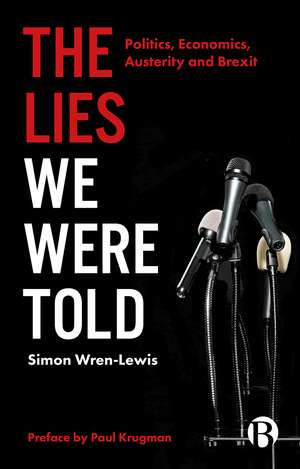The Lies We Were Told: Politic, Economics, Austerity and Brexit
Autor Simon Wren-Lewisen Limba Engleză Paperback – 6 noi 2018
Why did governments adopt austerity policies, and why were they so harmful? Why did the media largely ignore the experts who opposed these policies, and allow politicians to get away with lies? And why did voters choose Brexit when the economic consensus was that it would harm living standards?
Simon Wren-Lewis, winner of the SPERI/New Statesman Prize for Political Economy, is one of Britain's most respected economists. Since 2012, his widely-read Mainly Macro blog has been an influential resource for policymakers, academics and social commentators around the world. This book presents some of his most important work, telling the story of how the damaging political and economic events of recent years became inevitable.
Simon Wren-Lewis, winner of the SPERI/New Statesman Prize for Political Economy, is one of Britain's most respected economists. Since 2012, his widely-read Mainly Macro blog has been an influential resource for policymakers, academics and social commentators around the world. This book presents some of his most important work, telling the story of how the damaging political and economic events of recent years became inevitable.
Preț: 137.47 lei
Nou
Puncte Express: 206
Preț estimativ în valută:
26.32€ • 27.36$ • 21.82£
26.32€ • 27.36$ • 21.82£
Carte disponibilă
Livrare economică 17-31 ianuarie 25
Preluare comenzi: 021 569.72.76
Specificații
ISBN-13: 9781529202137
ISBN-10: 1529202132
Pagini: 320
Dimensiuni: 140 x 216 x 10 mm
Greutate: 0.36 kg
Ediția:1st Edition
Editura: Bristol University Press
Colecția Bristol University Press
ISBN-10: 1529202132
Pagini: 320
Dimensiuni: 140 x 216 x 10 mm
Greutate: 0.36 kg
Ediția:1st Edition
Editura: Bristol University Press
Colecția Bristol University Press
Notă biografică
Simon Wren-Lewis is a professor of economic policy at the Blavatnik School of Government at Oxford University and a Fellow of Merton College.
Recenzii
“The book is particularly useful in understanding the role of the media. . . . It’s the kind of thing I’d have liked to have discussed during my journalism degree, and I hope it is finding its way onto reading lists for economics and media students."
